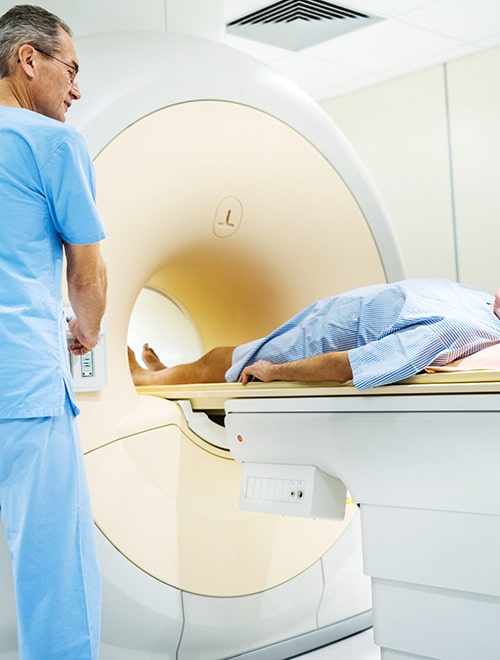- 3 min read
Are there treatments available for advanced prostate cancer?
There are several different treatment options for advanced prostate cancer, with emerging treatments being developed and tested within clinical trials. The best treatment for you depends on your age, general health, the type and stage of your cancer and your preferences.
Find out about clinical trials and new or emerging treatments by following the links below:
Types of treatments for advanced prostate cancer
The main treatments for advanced prostate cancer are ones that move through the blood stream to locate and control prostate cancer metastases wherever they are in your body. These are called systemic treatments.
The following are systemic treatments:
- Hormone therapy – this slows the growth and spread of prostate cancer by minimising the effect of testosterone on the cancer. It is also known as androgen deprivation therapy (ADT).
- Chemotherapy – chemotherapy has been shown to significantly improve survival for advanced prostate cancer patients. It is usually given together with hormone therapy injections.
- Radioisotope therapy – this involves injecting radioactive molecules into the bloodstream, which move through the blood to find prostate cancer cells, reduce the size of tumours, stop further spread of the cancer and relieve any pain caused by the cancer – one example is PSMA Therapy.
Sometimes, localised treatments that target specific areas of your cancer may be used to control cancer that has spread. These include:
- Radiation Therapy – this may be combined with a short course of hormone therapy
- Surgery – A transurethral resection of the prostate (TURP) is sometimes offered to men with advanced prostate cancer who have not had a radical prostatectomy and have symptoms of blocked urine flow (the surgeon trims away tissue that is blocking your urethra)
Follow the links below to learn more about these treatments:
Treatments for castrate-resistant prostate cancer
Castrate-resistant prostate cancer or CRPC is cancer that no longer responds to hormone therapy and continues to grow and/or spread even when testosterone levels are low.
There are several different types of treatment for castrate resistant prostate cancer. Before suggesting further treatments, your doctor may require repeat scans to try to assess the extent of the cancer, such as:
- Imaging tests – CT, MRI, bone scan
- PSMA-PET scan
Treatment options may include:
- Ongoing monitoring of PSA levels
- Using a different type of hormone therapy medicine – Novel or newer medications (called second generation (novel) hormone therapy medications) that work in different ways to block the effects of testosterone
- Chemotherapy
- Radiation therapy to treat cancer that has spread to other parts of the body (metastases)
- Radioisotope therapy, such as PSMA Therapy
- A clinical trial investigating a new form of treatment that may be suitable for you
- Watchful waiting
Learn more about these treatments by following the links below:
Watchful waiting for advanced prostate cancer
Occasionally, men choose watchful waiting instead of active treatment for advanced prostate cancer. This means that your cancer is monitored and only treated when symptoms arise. It involves regular appointments with your doctor to see how you are going. It might also involve PSA tests or imaging scans, particularly if your PSA level is rising rapidly or if you are developing symptoms from your cancer.
Deciding whether to have treatment for advanced prostate cancer
Take your time to understand the different treatment options and their side effects. Ask your healthcare team, medical oncologist, urologist and/or radiation oncologist to explain the different treatments, what is involved, the benefits and side effects and why it is a good option for you.
Your urologist with be able to discuss surgery with you and can provide you with a referral to see a radiation oncologist to discuss radiation therapy options. Seeing both a radiation oncologist and urologist is helpful to get accurate information about all the treatment options that are suitable for you. If you have advanced/metastatic prostate cancer, seeing a medical oncologist is also advised. You can also ask your healthcare team if there are any clinical trials of emerging treatments running that may be beneficial for you.
If your cancer can’t be cured, then the aim of treatment will always be to try to keep you as well as possible for as long as possible. Any treatment needs to be considered in terms of weighing up its potential benefits versus its potential side effects. Support and information can also be obtained from your GP, PCFA nurses, oncology nurse and/or prostate cancer support group members. It can also be very helpful to discuss treatment options with your partner or a family member and take them along to your appointments.
Key points
- There are many treatments available for advanced prostate cancer
- Your healthcare team can explain the best treatment options, side effects, benefits and risks according to your individual needs
- Advanced prostate cancer is mainly treated with systemic treatments although localised treatments may also be used
- You may choose watchful waiting instead of treatment for advanced prostate cancer
- Your healthcare team, supportive loved ones and/or a PCFA nurse can help you decide on treatment options






